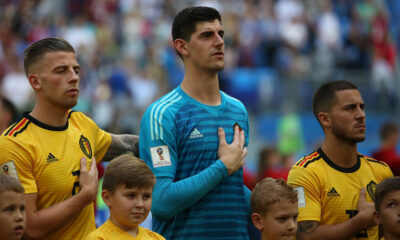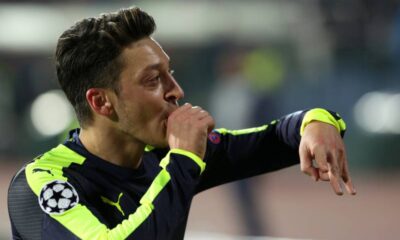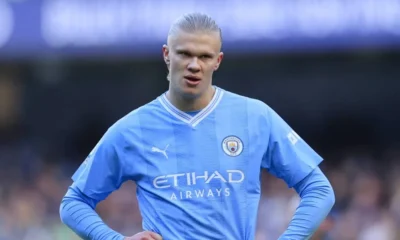Bundesliga
The story of Schalke 04: The total destruction of the club or How unreasonable do you have to be to manage like this?
One of the biggest giants of German football has experienced some truly unprecedented things in recent years. How can mismanagement and even worse decisions completely decimate a club that has regularly participated in European cups? This is the powerful story of Schalke 04.
One of the biggest giants of German football has experienced some truly unprecedented things in recent years. How can mismanagement and even worse decisions completely decimate a club that has regularly participated in European cups? This is the powerful story of Schalke 04.
Schalke 04 is a typical story of sporting failure, mismanagement and the power of one man. For almost two decades, Schalke 04 was synonymous with the name Clemens Tönnies. The local billionaire, who made an estimated €1.4 billion in the German meat industry, joined Schalke’s supervisory board in 1994 and became chairman in 2001.
Under his leadership, Schalke established itself as one of the top clubs in Germany and Europe. It has finished second in the Bundesliga four times and won three German Cups. They reached the quarter-finals of the Champions League in 2008 and the semi-finals in 2011.
Crucially, it was Tönnies’ extensive business network that brought Schalke a lucrative sponsorship deal with Gazprom, the Russian gas company whose name has adorned the club’s jerseys since January 2007. The Gelsenkirchen club’s current contract with the Russian firm expires at the end of the 2021/22 season.
However, Gazprom and the club’s management agreed this year to extend their cooperation until 2025. Schalke’s current contract with Gazprom is reportedly worth up to €150 million. According to Sky Deutschland, the new agreement includes a clause which guarantees that Gazprom will contribute an extra ten million in the event of Schalke’s relegation to the second division.
It should be noted that, despite this, the economic situation at the club has been deteriorating over the past years and Schalke has been drowning in debt. It was not only for this reason that Tönnies resigned as head of the German club’s supervisory board last year. He was also criticised for various non-football matters.
Between 2010 and 2016, Schalke almost halved its debts thanks to regular participation in European cups and lucrative sales of its stars. Manuel Neuer went to Bayern for €30 million, Draxler to Wolfsburg for €43 million and Sané moved to Manchester City for €52 million.
The paradox is that even in those years, when Schalke were already prosperous in a way, the club was already in trouble. The club’s management was watching the success of neighbouring Dortmund and as a result, Tönnies was no longer satisfied with successfully paying off his debts or regularly competing in cups.
So he replaced Horst Heldt with a new sporting director, appointing Christian Heidel from Mainz to the role. It was Heidel who then began to spend indiscriminately. Over the next two and a half years he signed four of the five most expensive reinforcements in Schalke’s history.
Namely Nabil Bentaleb, who came for 19 million euros from Tottenham. The most expensive item on the list, however, was Breel Embolo (26.5 million euros) from Basel. Sebastian Rudy and Yevhen Konoplyanka then came together for another nearly €30 million.
But that wouldn’t have been the worst of it, had four players not been allowed to leave for free, thanks to which Schalke would have cashed in tens, or perhaps hundreds of millions of euros into their then severely weakened coffers. It is reprehensible that the club’s management let players like Eric Maxim Choupo-Moting, Leon Goretzka, Max Meyer and Sead Kolašinac go for free.
Goretzka’s market value alone was around €40 million at the time of his transfer to Bayern! The fact that none of the aforementioned foursome are active in Gelsenkirchen is also a cause for tears. What’s more, the sums Schalke let them go for are, let’s say, very unsatisfactory. Konoplyanka left the club in September 2019 for just €1.8 million!
Bentaleb is currently without a commitment and guess how much Schalke received for him? Nothing at all. Rudy, on the other hand, is currently defending the colours of Hoffenheim, but he only left there in July this year. However, we can see the “free transfer” column again.
The last of the bunch is Embolo, who transferred to Mönchengladbach in 2019. However, Schalke did not receive even half of the original transaction for him. The transfer sum was eleven million euros.
Uwe Kemmer, a former member of Schalke’s supervisory board, admitted afterwards that they had burned over 150 million euros for Sporting Director Heidel. According to him, he wanted to do everything himself and did not want to consult anyone about the various final decisions, especially regarding transfers.
In the 2018/19 season, Schalke then finished only in fourteenth position and had to miss the European Cups for the first time since 2000. The loss of revenue from European competitions was another point that put the German giant in the situation it is currently in.
On the sporting side, the hiring of young coach Domenico Tedesco was also a very unfortunate affair. Respectively, it is true that Schalke finished second in the Bundesliga table in the 2017/18 season, but in the following season Tedesco could not handle the pressure that was put on the club and the team finished the 2018/19 season in fourteenth position.
Also due to all the above factors, there was a lot of nervousness in the cabin, with several altercations, with Kemmer stating afterwards that Tedesco was a young coach who simply wanted too much, and burnout was evident in his eyes.
This paradigm shift instituted by Tönnies, which should have borne fruit, was disastrous. But the worse was yet to come. According to Kemmer, the cooperation between coach Tedesco and Heidel as sporting director was also not working.
It probably goes without saying that the ensuing pandemic was just the icing on the cake and another piece in this horror story. Many Schalke fans on social media described it as a massive tsunami that brought the Gelsenkirchen outfit to the bottom.
The club couldn’t count on money from the Champions League, at the time of the competition’s suspension it was losing two to three million euros for every home game it didn’t play, and let’s add to that the huge losses already taken care of by the club’s former management.
Yes, Schalke, like many other teams, did take some steps to save money at the time of the biggest coronavirus crisis, but this was only a small consolation given the situation at the club. To make matters worse, a year after the scandal, Tönnies was accused of making racist remarks about Africans and his meatpacking plant became one of the hotbeds of the spread of Covid-19.
Kemmer and Tönnies subsequently resigned and it was clear that structural changes had to be made at the club. Peter Knäbel, who knows Schalke very well, was entrusted with the rebuilding work.
The German club also has a new finance director, Christina Rühl-Hamers. Schalke posted a loss of 52 million euros in 2020, with Hamers promising not to gamble with the club financially like that anymore.
Currently, the club is trying to solve the problems caused by the previous management and set up a completely different system than the one applied by Tönnies. What is certain, however, is that it will be a long run given the financial aspect of the club. However, let’s hope that the German giant will not only climb back into the elite over the next few seasons, but become a feared giant once again.
Schalke 04, DW, Bundesliga














